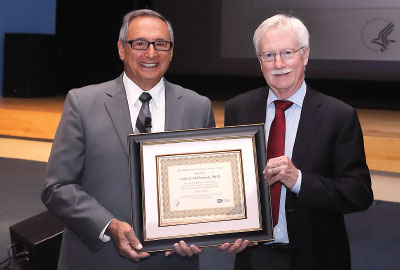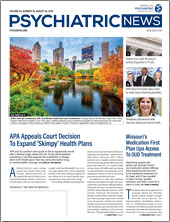“I think it’s time we retire the term ‘relapse,’ ” when thinking about the treatment of alcohol use disorder (AUD), said Carlo DiClemente, Ph.D., at the start of the National Institute on Alcohol Abuse and Alcoholism (NIAAA) Jack Mendelson, M.D., Honorary Lecture in July. Initiated in 2009, the Mendelson Lecture recognizes the contributions of the late psychiatrist Jack Mendelson in establishing alcohol use disorder as a medical condition and helping to pave the way for the formation of the NIAAA in 1970.
DiClemente, an emeritus professor of psychology at the University of Maryland, Baltimore County, and co-developer of the transtheoretical model (TTM, the concept that people go through discrete “stages” when undergoing a behavioral change), then proceeded to make his case to the assembled audience at the National Institutes of Health (NIH) campus in Bethesda, Md.
Though the term relapse is used to describe the return of symptoms of other disorders such as depression, it is tightly associated with alcohol and drug use, DiClemente noted.
“But what is a relapse?” he asked the audience. For many, relapse is seen as the opposite state of recovery, but DiClemente disagreed. “I think this belief is stigmatizing and contributes to a fatalistic worldview for those looking to quit,” he said.
“I don’t see it as the opposite of recovery, but rather an event that may be necessary for recovery,” he continued.
DiClemente came to this conclusion after working to adapt the TTM (which was initially conceived following observations of people trying to quit smoking) for alcohol use disorder. He looked at characterizing relapse as a stage alongside the established stages of behavioral change: precontemplation, contemplation, preparation, action, and maintenance.
“But we found that people who reported a relapse looked very different,” he said. “Some went back to the precontemplation stage and kept drinking, but others cycled directly to contemplation or preparing to quit.” DiClemente also noted that people could relapse from any stage. This led him to consider relapse as part of the process toward behavioral change. At each step people need to complete certain tasks in order to fully embrace their change; if they are not ready to adequately complete those tasks, then they might cycle back to a previous step.
“For problem drinkers, alcohol has become an important part of their lives,” he said. “Learning how to overcome these changes takes time, energy, and focus. There will be errors along the way, but if we focus on how patients can benefit from the experience of failure, and not the failure itself, it can change the perspective of research and clinical practice.”
If the term “relapse” should be retired, what should take its place then? “Let’s call it a recycling,” DiClemente said. “A recycling on the road to recovery.” ■
More information on the Jack Mendelson Honorary Lecture series is posted
here.

